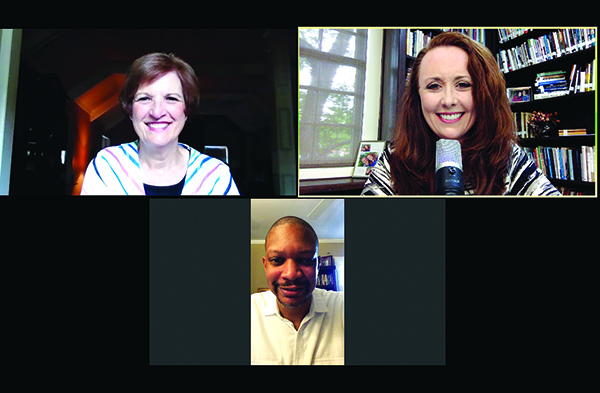By Margaret Colson
The Alabama Baptist
Amid racial tension in our nation, Birmingham-area minister James Sutton urges Alabama Baptists to maintain hope.
“As people of faith we definitely have to maintain hope,” said Sutton, who currently serves on the Diversity Advisory Council for the Christian organization Converge.
In a wide-ranging interview with TAB Talks co-hosts Jennifer Davis Rash and Debbie Campbell, Sutton recalled how he traveled to Minnesota recently in an effort to foster relationships with black pastors, describing the experience as emotional.
It was “overwhelming to be on the ground where George Floyd was murdered, where his life was taken from him, to feel the energy of the community where he lived, worked and played, enjoyed life,” Sutton said.
Floyd is the 46-year-old black man who was killed in Minneapolis, Minnesota, during a late May arrest in which a white police officer knelt on his neck for close to nine minutes while Floyd was handcuffed and lying face down on the pavement. Floyd’s death has sparked nationwide protests and calls for reform.
While in Minnesota, Sutton attended a memorial service for Floyd, during which there was an eight minute, 46-second moment of silence to signify the amount of time the officer’s knee was on Floyd’s neck.
“I wept the whole entire time,” said Sutton.
‘Just the latest’
“George Floyd is just the latest person in a very, very long list of people who have had their lives taken by police officers or by people who saw themselves as police officers,” said Sutton, who also mentioned the deaths of Ahmaud Arbery and Trayvon Martin.
“So it’s just another person. For me, George Floyd … could have been my older cousin. He would have been the cousin who was taking me somewhere I shouldn’t have been going when I was younger. He would have been the person telling me things that I shouldn’t have known at the time. But we would have looked back at a family reunion and laughed at how naïve I was about those times. I see him as somebody who could have easily been an older cousin to me. It’s emotional in that regard,” Sutton said.
Although Sutton acknowledged that many white people in America and throughout the world have been involved in “marching … and standing in solidarity with black people,” Sutton believes that black Christians and white Christians “have always responded differently to these kinds of issues.”
“In the same way there are two Americas that we experience — one that white people experience and one that black people experience — there’s also two churches unfortunately. And we have had to mourn and grieve alone many times.”
Through time, Sutton said he sees “more and more white brothers and sisters seem to be becoming aware and conscious of the history of this country, of the history within their own churches and denominations and seem to be waking up. I think that’s very, very positive.”
Seek truth
Sutton expressed concern about what he described as a “slanted history of America … an exceptionalism about America” and urged Americans to learn “the actual truth of the story. We also have to learn that there’s a history with black people and police. The first police for black people were slave-catchers. So we’ve always had problems with law enforcement.”
“So we’ve always had this antagonistic relationship,” he said. “It’s never been about whether we committed crimes or not; it’s always been about policing us, targeting us and protecting white citizens from us. So it’s a lot to learn, and if our white brothers and sisters did that work (learned the history of black people and law enforcement), I think their eyes would be open to a great deal of what we’re saying even up to this present day and how they can actually help.”
He advised whites and blacks to come together in legitimate friendships and emphasized that the friendships should not be based on a subordinate/insubordinate relationship, such as an employer/employee relationship. Once those relationships are established, truth should be honored.
A challenge
“Unfortunately I think our white brothers and sisters enter into these conversations wanting genuinely to help but not really being prepared for the full reality of the truth of our experience in this country or the truth of how this country came into being,” Sutton said. “Some people are very invested, very invested, in a false narrative, and when that narrative gets disrupted, they check out because their need is to maintain that false narrative.”
He challenged white believers to listen to interviews, podcasts and speeches, and to read books concerning racial inequities in America.
“All of this material has been there since there was an issue with race, an issue with justice. A lot of times when our white brothers and sisters ask, ‘What can we do?’ it becomes clear they have not been listening for the last 400 years because we’ve already answered that question. We’ve said, ‘Here’s a blueprint for how to solve these problems,’” pointing to systemic changes in society.
“Yes, there is a need to hope, but we also have to fight; we have to pray as people of faith,” Sutton said. “Hope is not necessarily that this world will get better. That’s not always the case. But our hope is that God will be glorified and that victory will be won because Jesus got up. That’s where the real hope is. The hope is not that all these systems will actually really change. I don’t know that they will.
“I do know that God is on the throne. I do know that vengeance is His. He will reserve final judgment for all those who have oppressed, who have murdered, who have stolen, who have harmed the widow and the orphan and the immigrant. He will get the victory,” Sutton concluded.






Share with others: